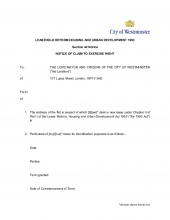Extend your lease
Can I extend my lease?
If you have owned your property for at least two years it is likely you will have the right to extend your lease. If you meet the criteria, you will be able to buy a new lease which will expire 90 years after your current lease expires.
Can I extend my lease if I am shared ownership leaseholder?
Shared Ownership leaseholders can now extend their leases when they own less than 100% by a discretionary lease extension.
Discretionary Lease extensions will be provided on the following terms:
- The same time limits will be in place as a statutory lease extension
- The new lease will be issued on the same terms as the original lease
- The Application Notice and Landlord’s Counter Notice will require the same information as a statutory lease extension
- Leaseholders must comply with the same necessary conditions as a statutory lease extension, for example; no current breach of lease, no arrears, agree to pay all reasonable costs of the Freeholder.
3 steps to extending your lease
- To begin the lease extension process you must serve us with a Section 42 notice which is a confirmation of the premium amount you are willing to pay.
- On receipt, we instruct our valuer to calculate the premium. Leasehold Operations are unable to advise on the valuation of your property.
- After receiving the valuation, we provide our Section 45 counter- notice, which either accepts or counters the terms of your notice.
Please note that you are required to complete your lease extension within six months from the date of our Section 45 notice. Should this matter not complete within six months, it will be withdrawn and you will be unable to re-apply until 12 months have elapsed from the date of withdrawal.
How much am I likely to pay?
Please note that Leasehold Operations are unable to advise on the price of your lease extension. We recommend you visit Leasehold Advisory Service for independent advice.
Our fees include:
- £200 administrative fee
- £350 valuation fee
- £102 lease plan fee
- the solicitor’s actual costs, which are set at £1,365 but may increase if the matter becomes protracted
Extend your lease video
The King's Speech
The King's Speech delivered on 7th November 2023 stated ‘My Ministers will bring forward a bill to reform the housing market by making it cheaper and easier for leaseholders to purchase their freehold …”. The bill looks to empower leaseholders through the key points listed below as stated in The King's Speech Briefing Note:
- Making it cheaper and easier for existing leaseholders in houses and flats to extend their lease or buy their freehold.
- Increasing the statutory lease extension term from 90 years to 990 years for both houses and flats, with ground rent reduced to £0.
- Removing the requirement for a new leaseholder to have owned their house or flat for two years before they can benefit from these changes so that more leaseholders can exercise their right to the security of freehold ownership or a 990-year lease extension as soon as possible.
- Increasing the 25% ‘non-residential’ limit preventing leaseholders in buildings with a mixture of homes and other uses such as shops and offices, from buying their freehold or taking over management of their buildings – to allow leaseholders in buildings with up to 50% non-residential floorspace to buy their freehold or take over its management.
- Banning the creation of new leasehold houses so that – other than in exceptional circumstances – every new house in England and Wales will be freehold from the outset.
- Consult on capping existing ground rents, to “ensure that all leaseholders are protected from making payments that require no service or benefit in return, have no requirement to be reasonable, and can cause issues when people want to sell their properties.” Subject to that consultation, a cap is likely to be introduced through this Bill.
The full briefing can be found on the government website: https://www.gov.uk/government/publications/the-kings-speech-2023-background-briefing-notes
The Leasehold and Freehold Reform Government Bill can be found here: https://bills.parliament.uk/bills/3523
Should you extend your lease or should you wait for the changes to be implemented?
The first two bullet points stated above will see a significant change to extending leases for existing lessees. Therefore, you may be unsure on whether to extend your lease now or whether you should wait for the changes to be implemented before extending. The Leasehold Advisory Service provide advice on what leaseholders should do in this situation. We would recommend reading through this advice using the link below.
if you are still unsure, you can book an appointment with The Leasehold Advisory Service to speak to one of their advisors regarding this. Alternatively, you can also contact Leasehold Operations through one of the methods listed in the link below to discuss this further or get more information regarding your lease.
https://www.westminster.gov.uk/housing/leaseholders/contact-us


